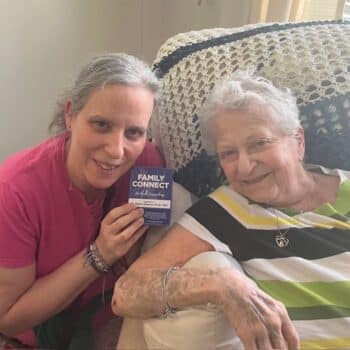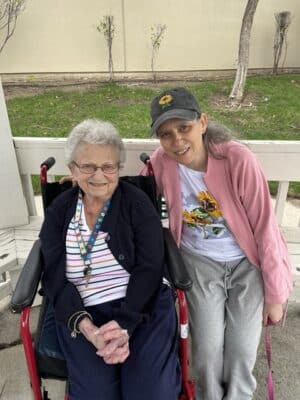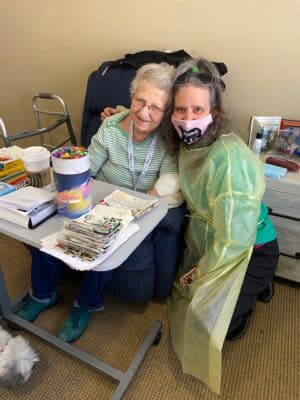Mondays With Mom

My mom is expressive and animated, and the questions I ask can give way to a series of different emotions within her. I’m thankful she has not lost her ability to communicate and she can engage in conversations.
August 22, 2024
Terri Moore is a caregiver to her mother who was diagnosed with Alzheimer’s in 2019. She finds joy in filming her conversations with her mother and sharing them on social media.
My mother was diagnosed with Alzheimer’s in 2019 and I became her primary caregiver while she lived on her own in her own home. During this time she also developed sepsis four separate times. When my mother was diagnosed for the fifth time I finally came to terms with the reality that she needed more care than I could provide. I knew we couldn’t afford to pay to keep her in her own home with 24/7 at-home medical care either. I was still very reluctant to move my mom from a place where she felt immense comfort and the decision weighed heavily on me.
Something changed when a case manager at the care agency I was working with asked me whether I saw myself as a manager or a daughter. I knew moving my mom into a place where she could receive 24/7 care was the only option for her safety.
During the pandemic, I was only able to see her for 30-minute visits, outdoors, once a week. It was not until March of 2021 that our regular indoor visits resumed. In January 2024 I decided to start documenting my mother’s long-term memories. I began asking her question cards and filmed her responses as part of a series. Since then, I’ve posted the videos to my Instagram, Facebook, YouTube and TikTok, and named the series “Mondays with Mom.” Often I find myself laughing at the joyful TV persona she sometimes puts on for the camera.

As my mom’s journey with Alzheimer’s has progressed, there are less things she finds joy in doing, so during our visits I play this game with her which then sparks conversation and by the end of our visit she is usually in a lighter mood.
It has served as a way for me to remind others that some people living with dementia can still recall long-term memories even though short-term memory function can be severely impacted. While my mom’s short-term memory has been significantly affected by Alzheimer’s, by using these question cards I’ve learned things about her life that she’d never shared before her diagnosis. One day she was telling me about a restaurant she frequented as a kid. I searched the name and discovered it was a supper club that was popular in the 1940s. I continue to be amazed by her long-term memory. My goal through sharing the videos is to show people that even with a devastating disease like Alzheimer’s, you can still find joy.
My mom is expressive and animated, and the questions I ask can give way to a series of different emotions within her. I’m thankful she has not lost her ability to communicate and she can engage in conversations. At the same time, her ability to communicate has in some ways made it more difficult for me to advocate for and convince medical professionals of the care she requires. Dementia presents differently in everyone, and nonverbal and verbal dementia can both be challenging.
By filming my mom, I feel like I’m able to hold on to memories that otherwise would be fleeting. The process of filming the videos has helped me spend more time with her and shifted my focus to a more positive perspective on the things that she still can do rather than those things she can’t.
